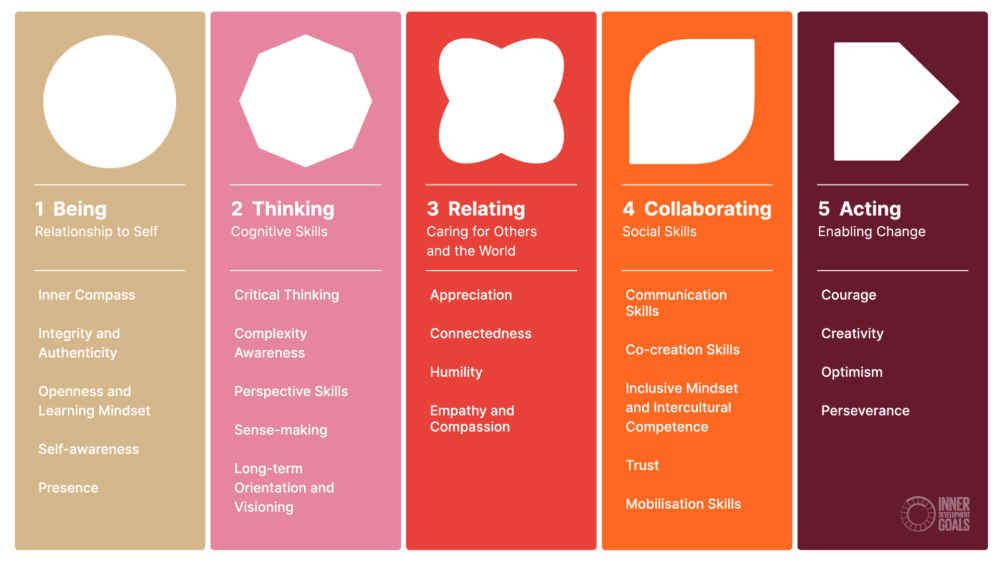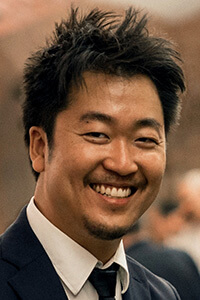
The Inner Development Goals were developed to equip individuals and organizations with the inner qualities that enable them to take the kinds of action that will result in transformative efforts around climate change.
A description of the Inner Development Goals (IDGs), a set of 23 key human development skills across five dimensions, includes such terms and phrases as “being,” “relating,” and “inner compass,” which can come off as overly abstract and hard to pin down. However, when Daniel Hires, chief marketing officer for the nonprofit Inner Development Goals Foundation, first heard about them, he immediately recognized the potential: Depending on who you speak to, inner development can sound “a little woo woo” he told Convene in an interview earlier this year, and so the IDG Framework aims to give a clear and science-based structure to overcome some of the skepticism.

Daniel Hires
But the intention of the IDGs couldn’t be more down to earth. Based on global research drawn from fields including psychology, sociology, and sustainability, and created as a companion to the United Nations Sustainable Development Goals (SDGs), the IDGs were developed to equip individuals and organizations with the inner qualities that enable them to take the kinds of action that will result in transformative efforts around climate change.
There is a gap between knowing and doing, said Hires, who will lead a workshop on Thursday, Oct. 3 at PCMA’s Convene 4 Climate in Barcelona. From a from a technical and scientific standpoint, “it seems that we almost have all of the solutions out there,” he said, “but if we are just looking at [sustainability] as a technical problem — as renewable energy capacity, or how much percentage of our waste is in the circular economy — we’re missing a big part of this. Are the organizations that we have created able to make the bold and courageous decisions, perhaps, that we need [them] to?” The ability to work collaboratively within complex systems, to incorporate empathy and social justice, and exercise creativity and hope, are the kinds of skills IDGs are intended to build.
Since its founding three years ago, the Inner Development Goals Foundation and the IDG framework’s influence have mushroomed. More than 600 IDG hubs in 80 countries have popped up around the world, from Lima, Peru, to Cape Town, South Africa, to Portland, Maine. The IDG foundation also has entered into business partnerships with multiple corporations ranging from IKEA to Google, and is working with organizations, including the World Business Council for Sustainable Development. Through a partnership with PCMA, the IDGs are finding their way into the business events industry.
From Oct. 16 to 18, the foundation will host the IDG Summit 2024 in Stockholm, Sweden, and online, where it will bring together global artists, storytellers, and speakers from academia, business, and government, with the aim, according to the IDG website, of “shifting the narrative on sustainability and human development toward more hope and action.”
Events have a huge potential for making a difference in sustainability because of how many people they reach, Hires said. And the events industry is one that finds value in doing things differently — “nobody wants to have a boring event,” he said.
From his perspective, however, while the industry also has huge potential to be part of the solution, the possibilities haven’t been fully tapped. He said he has heard audible sighs when the topic of sustainability has come up in audiences made up of event professionals – and he fully understands where this comes from. “There’s been a tendency to frame sustainability as cutting things that are now declared as bad – don’t fly, don’t eat meat, don’t use plastic bottles. This is not only uninspiring and frankly off-putting, this isn’t how I think you talk to adults”, he said.
“There’s a much more inspiring and hopeful story that too few people see out there,” Hires said. “Our challenges are human-made, and so it is also us who can un-make them. For that however, we need to grow both as people and as organizations to foster skills such as integrity, courage, critical thinking, or empathy. These skills help us not just with sustainability, but tackle almost any complex challenge we face.”
“Does the quality of your work suffer, when you feel stressed instead of feeling safe? If so, how often do you consider creating a safer environment for your team or your suppliers, so they can perform better? This is just a glimpse of the untapped potential of considering the inner dimension of collaboration”, Hires explained.
“At events, people can be more open to trying out something new, so it’s a great opportunity to try out some inner development exercises. And maybe this might inspire some to continue – whether that’s taking five minutes for some gratitude journaling or meditation in the morning, or having an open conversation about how we tend to react under stress with our team – and how we would prefer to act based on our values. This is how we start becoming bigger versions of ourselves, and can create more resilient organizations, and ultimately societies that are able to rise to the complex challenges we are facing today.”
Barbara Palmer is deputy editor of Convene.
